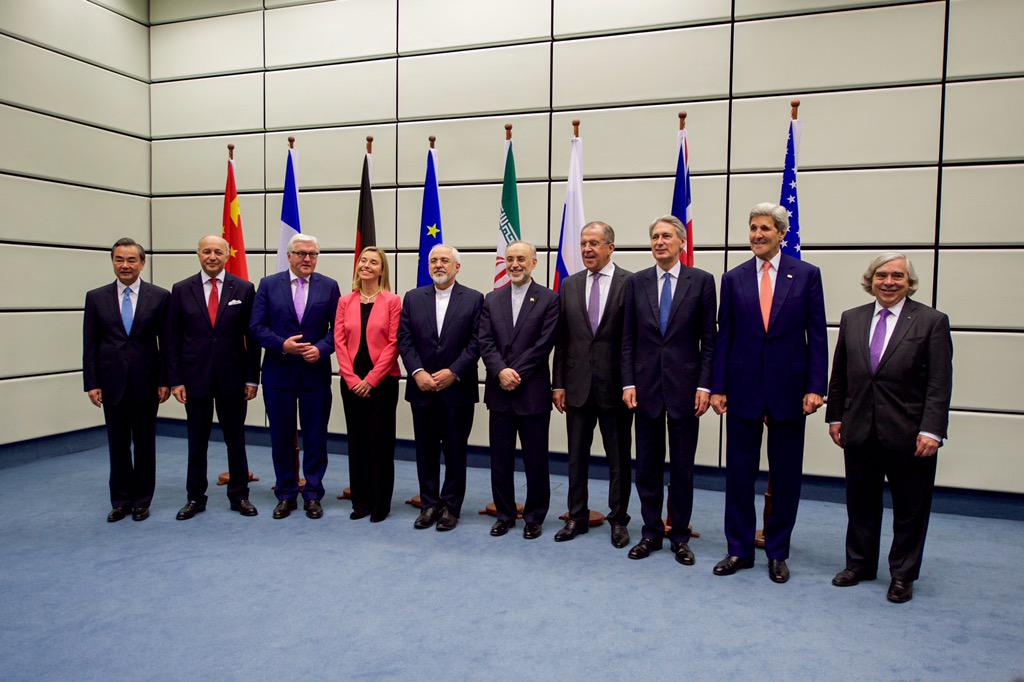
World powers(US, UK, France, China, Russia and Germany ) have reached a deal
with Iran on limiting Iranian nuclear activity in return for the lifting
of international economic sanctions
The deal sealed in Vienna aims at ensuring Iran does not obtain the nuclear bomb, relieving sanctions against Tehran and ending decades of tension with the West.
The deal sealed in Vienna aims at ensuring Iran does not obtain the nuclear bomb, relieving sanctions against Tehran and ending decades of tension with the West.
After 18 days of intense and often fractious negotiation, world powers
and Iran struck a landmark deal Tuesday July 14,2015 to curb Iran's nuclear program
in exchange for billions of dollars in relief from international
sanctions
The deal, known as the Comprehensive Joint Plan of Action, was signed in Vienna on 14 July 2015
In return, once Iran has taken key steps to introduce these restrictions, the international community will lift some of its sanctions on Iran, delivering significant economic and financial benefits
His Iranian counterpart, Hassan Rouhani, said it opened a "new chapter" in Iran's relations with the world.
Negotiations between Iran and six world powers - the US, UK, France, China, Russia and Germany - began in 2006.
The so-called P5+1 want Iran to scale back its sensitive nuclear activities to ensure that it cannot build a nuclear weapon.
Iran, which wants crippling international sanctions lifted, has always insisted that its nuclear work is peaceful
UK PM David Cameron describes the deal with Iran as historic, saying it "secures our fundamental aim - to keep Iran from developing a nuclear weapon - and that will help to make our world a safer place."
He says the deal required leadership, courage and determination and that it was time to move forward and put it into place.
UK PM David Cameron said Iran will reap economic benefits, so long as it delivers on everything it has agreed to do.
Iranian President Hassan Rouhani pledged that Iran "will never seek a nuclear weapon, with or without the implementation" of the deal agreed with world powers in Vienna.
US President Barack Obama says this deal offers an opportunity to move in a new direction. "We should seize it," and warns Congress that he will veto any attempt to block the deal.
"We are certain that today the world has breathed a huge sigh of relief," Putin said in a statement issued by the Kremlin.
UN Secretary General Ban Ki-moon on Tuesday welcomed the 'historic' agreement to curb Iran's nuclear program, saying it could help bring peace to the Middle East.
NATO hailed the Iran nuclear deal on Tuesday as a 'historic breakthrough' that would strengthen global security, but urged Tehran to comply with the terms of the accord.
''This agreement represents a historic breakthrough which, once fully implemented, will strengthen international security,'' said the NATO's secretary general, Jens Stoltenberg
US Secretary of State John Kerry and Iranian Foreign Minister Mohammad Javad Zarif at a bilateral meeting in Vienna, Austria, 14 July 2014

Representatives of negotiating groups and nations in the Iran nuclear talks pose in Vienna, Austria on July 14, 2015.
What's In The Iran Nuclear Deal?
The agreement between Iran and six world powers that was finalised in Vienna,Austria on Tuesday July 14,2015 will roll back Iran's nuclear work in exchange for the easing of economic sanctions
Just a few years ago, the prospect of Iran and the international community reaching agreement on the country's deeply controversial nuclear activities seemed inconceivable
Yet after years of talks and several missed deadlines -- diplomats finally found enough common ground to conclude the historic accord, which contains several critical compromises for each side
RESTRICTIONS ON NUCLEAR WORK
In addition, Iran has agreed not to enrich uranium over 3.67 percent, and will reduce its total stockpile of uranium by some 98 percent, from around 10,000 kg to 300 kg. These constraints are effective for 15 years. The excess stockpile will be sold overseas or downgraded to a lower level of enrichment.
Iran will keep one nuclear enrichment site, Natanz, and convert its underground Fordo site into a “nuclear, physics and technology centre.” Iran’s heavy water reactor at Arak will be rebuilt so that it cannot produce weapons-grade plutonium.
Most of these restrictions on Iran’s nuclear program had already been agreed to in the framework deal signed in April 2015
INCREASING 'BREAKOUT TIME'
These measures increase the amount of time it would take Iran to produce one nuclear bomb, referred to as “breakout time,” to one year. Analysts currently estimate Iran’s breakout time to be two to three monthsThis is a key selling point of the deal for the Obama administration, although skeptical lawmakers and Israeli officials will likely raise questions about what happens after the nuclear restrictions expire in 10 and 15 years. U.S. officials acknowledge that Iran could then expand its nuclear work and reduce its breakout time, but note that the program will continue to be monitored by the IAEA for longer than that.
VERIFICATION
Under the deal, IAEA inspectors will have increased access to Iran’s uranium enrichment sites for 25 years.Iran’s supreme leader had balked at the idea of allowing the inspectors into military facilities and giving them interviews with nuclear scientists, both of which the U.S. had insisted were vital. Under a compromise solution, the final deal outlines a dispute resolution mechanism if Iran turns down IAEA requests for access
SANCTIONS RELIEF
As soon as the IAEA verifies that Iran has complied with the restrictions on its nuclear program, the United Nations, European Union and U.S. will lift nuclear-related sanctions on the country.The deal includes a “snap-back” provision -- which had been a priority for U.S. lawmakers -- that will quickly reimpose sanctions if the agreement is violated. Possible violations will be investigated and U.N. sanctions reintroduced within 65 days, a much faster timeline than the current system of investigations.


No comments:
Post a Comment